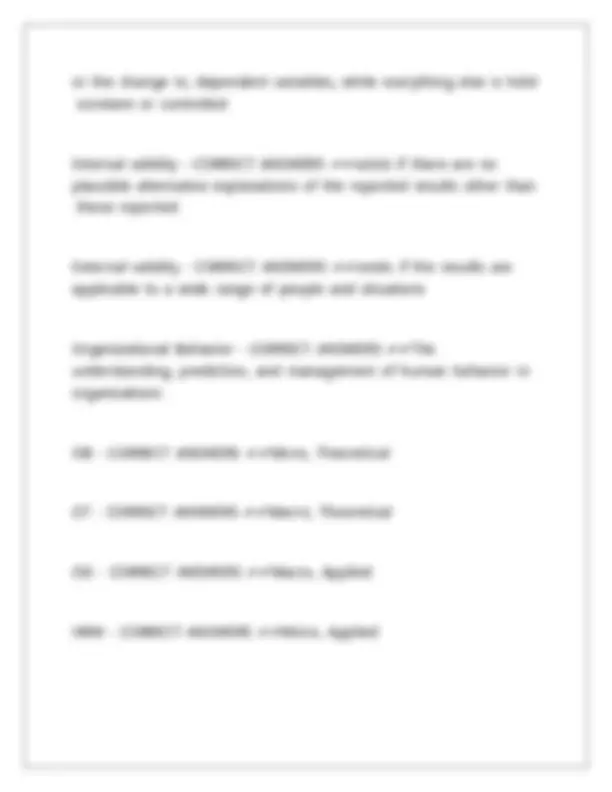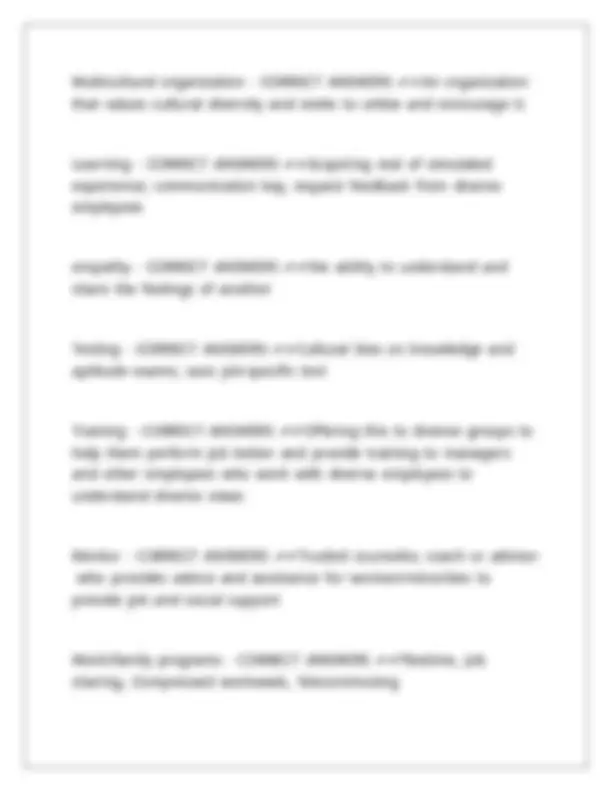





Study with the several resources on Docsity

Earn points by helping other students or get them with a premium plan


Prepare for your exams
Study with the several resources on Docsity

Earn points to download
Earn points by helping other students or get them with a premium plan
Community
Ask the community for help and clear up your study doubts
Discover the best universities in your country according to Docsity users
Free resources
Download our free guides on studying techniques, anxiety management strategies, and thesis advice from Docsity tutors
LSUS MBA 704 Exam 1 QUESTIONS WITH ANSWERS
Typology: Exams
1 / 6

This page cannot be seen from the preview
Don't miss anything!




Paradigm |- |\CORRECT |\ANSWERS |\✔✔a |\model; |\an |\example Theory |\X |- |\CORRECT |\ANSWERS |\✔✔assumes |\that |\workers |\are |
basically |\lazy, |\error-prone, |\and |\extrinsically |\motivated |\by |\money |
and, |\thus, |\should |\be |\directed |\from |\above. Organizational |\Behavior |\Approach |- |\CORRECT |\ANSWERS |
✔✔Employees |\are |\complex, |\and |\theoretical |\understanding |
supported |\by |\research |\is |\needed |\before |\applications |\are |\made |\to |
manage |\employees One-eighth |\Situation |- |\CORRECT |\ANSWERS |\✔✔Only |\1/8 |\of |
organizations |\buy |\into |\importance |\and |\value |\of |\human |\resources, |
incorporate |\high |\performance |\work |\practices, |\and |\stick |\with |\these |
practices knowing-doing |\gap |- |\CORRECT |\ANSWERS |\✔✔the |\gap |\between |\what |
people |\know |\and |\what |\they |\actually |\do
evidence-based |\management |- |\CORRECT |\ANSWERS |\✔✔Using |\hard |
facts |\and |\empirical |\evidence |\to |\make |\decisions Hawthorne |\studies |- |\CORRECT |\ANSWERS |\✔✔A |\series |\of |\studies |
during |\the |\1920s |\and |\1930s |\that |\provided |\new |\insights |\into |
individual |\and |\group |\behavior Hawthorne |\effect |- |\CORRECT |\ANSWERS |\✔✔productivity |\increases |
when |\workers |\are |\given |\special |\attention |\and |\were |\enjoying |\a |
novel, |\interesting |\experienced meta-analysis |- |\CORRECT |\ANSWERS |\✔✔A |\research |\technique |\that |
combines |\the |\statistical |\results |\of |\many |\studies |\of |\the |\same |
question, |\yielding |\an |\estimate |\of |\the |\size |\and |\consistency |\of |\a |
variable's |\effects. Theory |- |\CORRECT |\ANSWERS |\✔✔simplification |\of |\reality; |\why |
something |\occurs Research |\design |- |\CORRECT |\ANSWERS |\✔✔Primary |\aim |\is |\to |
establish |\a |\cause-and-effect |\relationship; |\survey |\studies, |\case |
studies, |\and |\experimental |\design Experimental |\Design |- |\CORRECT |\ANSWERS |\✔✔Involves |\the |
manipulation |\of |\independent |\variables |\to |\measure |\their |\effect |\on, |\
Cognitive |\Framework |- |\CORRECT |\ANSWERS |\✔✔Gives |\humans |\credit |
and |\assumes |\that |\behavior |\is |\purposeful |\and |\goal |\oriented Behavioristic |\Framework |- |\CORRECT |\ANSWERS |\✔✔framework |
stresses |\the |\importance |\of |\dealing |\with |\observable |\behaviors |
instead |\of |\the |\elusive |\mind |\that |\had |\preoccupied |\earlier |
psychologists. |\Cognitions |\not |\needed Social |\Cognitive |\Framework |- |\CORRECT |\ANSWERS |\✔✔Acknowledges |
human |\cognitions |\and |\environment |\role |\in |\behavior; |\says |\that |
cognitions, |\environment, |\and |\behavior |\interact |\and |\determine |\each |
other Social |\cognitive |\theory |- |\CORRECT |\ANSWERS |\✔✔Organizational |
behavior |\results |\from |\the |\reciprocal |\interaction |\among |\the |\unique |
personality |\characteristics |\of |\organizational |\participants, |
organizational |\environment |\factors |\such |\as |\supervision |\recognition |
of |\pay |\for |\performance, |\and |\the |\organizational |\behavior |\itself Global |\Mindset |- |\CORRECT |\ANSWERS |\✔✔Attribute |\that |\allows |
individuals |\to |\compensate |\for |\a |\cultural |\knowledge |\gap |\by |\being |
able |\to |\understand |\similarities |\and |\differences |\that |\distinguish |
cultural |\groups |\and |\being |\comfortable |\within |\those |\different |
cultural |\environments
Multicultural |\organization |- |\CORRECT |\ANSWERS |\✔✔An |\organization |
that |\values |\cultural |\diversity |\and |\seeks |\to |\utilize |\and |\encourage |\it. Learning |- |\CORRECT |\ANSWERS |\✔✔Acquiring |\real |\of |\simulated |
experience; |\communication |\key, |\request |\feedback |\from |\diverse |
employees empathy |- |\CORRECT |\ANSWERS |\✔✔the |\ability |\to |\understand |\and |
share |\the |\feelings |\of |\another Testing |- |\CORRECT |\ANSWERS |\✔✔Cultural |\bias |\on |\knowledge |\and |
aptitude |\exams; |\uses |\job-specific |\test Training |- |\CORRECT |\ANSWERS |\✔✔Offering |\this |\to |\diverse |\groups |\to |
help |\them |\perform |\job |\better |\and |\provide |\training |\to |\managers |
and |\other |\employees |\who |\work |\with |\diverse |\employees |\to |
understand |\diverse |\views Mentor |- |\CORRECT |\ANSWERS |\✔✔Trusted |\counselor, |\coach |\or |\advisor |\who |\provides |\advice |\and |\assistance |\for |\women/minorities |\to |
provide |\job |\and |\social |\support Work/family |\programs |- |\CORRECT |\ANSWERS |\✔✔Flextime, |\Job |
sharing, |\Compressed |\workweek, |\Telecommuting